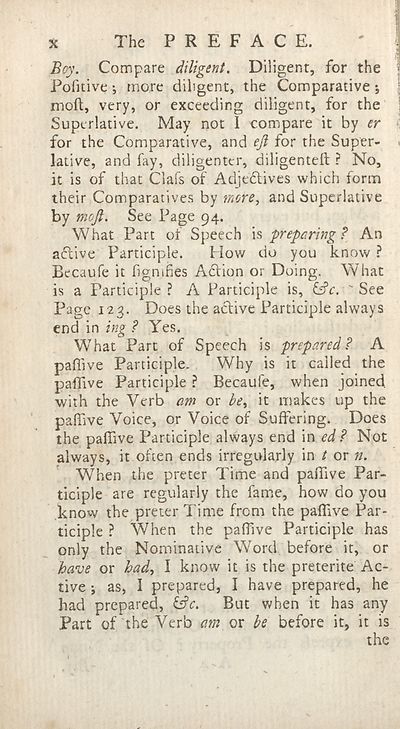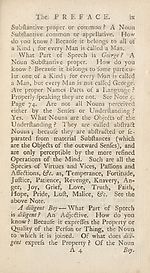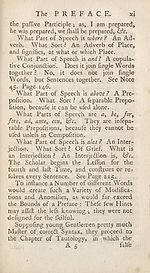Education > British grammar: or, an essay, in four parts, towards speaking and writing the English language grammatically, and inditing elegantly
(20)
Download files
Complete book:
Individual page:
Thumbnail gallery: Grid view | List view

x The P R E F A C E.
Boy. Compare diligent. Diligent, for the
Pofitive more diligent, the Comparative •,
moft, very, or exceeding diligent, for the
Superlative. May not 1 compare it by er
for the Comparative, and ejl for the Super¬
lative, and fay, diligenter, diligenteft ? No,
it is of that Clafs of Adjectives which form
their Comparatives by more, and Superlative
by mojl. See Page 94.
What Part of Speech is preparing? An
active Participle. How do you know ?
Becaufe it figntfies Action or Doing. What
is a Participle ? A Participle is, &V. See
Page 123. Does the active Participle always
end in ing ? Yes.
What Part of Speech is prepared? A
paffive Participle. Why is it called the
paflive Participle ? Becaufe, when joined
with the Verb am or be, it makes up the
paffive Voice, or Voice of Suffering. Does
the paffive Participle always end in ed? Not
always, it often ends irregularly in t or n.
When the preter Time and paffive Par¬
ticiple are regularly the fame, how do you
know the preter Time from the paffive Par¬
ticiple ? When the pafTive Participle has
only the Nominative Word before it, or
have or had, I know it is the preterite Ac¬
tive ; as, I prepared, I have prepared, he
had prepared, &c. But when it has any
Part of the Verb am or be before it, it is
the
Boy. Compare diligent. Diligent, for the
Pofitive more diligent, the Comparative •,
moft, very, or exceeding diligent, for the
Superlative. May not 1 compare it by er
for the Comparative, and ejl for the Super¬
lative, and fay, diligenter, diligenteft ? No,
it is of that Clafs of Adjectives which form
their Comparatives by more, and Superlative
by mojl. See Page 94.
What Part of Speech is preparing? An
active Participle. How do you know ?
Becaufe it figntfies Action or Doing. What
is a Participle ? A Participle is, &V. See
Page 123. Does the active Participle always
end in ing ? Yes.
What Part of Speech is prepared? A
paffive Participle. Why is it called the
paflive Participle ? Becaufe, when joined
with the Verb am or be, it makes up the
paffive Voice, or Voice of Suffering. Does
the paffive Participle always end in ed? Not
always, it often ends irregularly in t or n.
When the preter Time and paffive Par¬
ticiple are regularly the fame, how do you
know the preter Time from the paffive Par¬
ticiple ? When the pafTive Participle has
only the Nominative Word before it, or
have or had, I know it is the preterite Ac¬
tive ; as, I prepared, I have prepared, he
had prepared, &c. But when it has any
Part of the Verb am or be before it, it is
the
Set display mode to:
![]() Universal Viewer |
Universal Viewer | ![]() Mirador |
Large image | Transcription
Mirador |
Large image | Transcription
| Antiquarian books of Scotland > Education > British grammar: or, an essay, in four parts, towards speaking and writing the English language grammatically, and inditing elegantly > (20) |
|---|
| Permanent URL | https://digital.nls.uk/136144794 |
|---|
| Description | Thousands of printed books from the Antiquarian Books of Scotland collection which dates from 1641 to the 1980s. The collection consists of 14,800 books which were published in Scotland or have a Scottish connection, e.g. through the author, printer or owner. Subjects covered include sport, education, diseases, adventure, occupations, Jacobites, politics and religion. Among the 29 languages represented are English, Gaelic, Italian, French, Russian and Swedish. |
|---|

